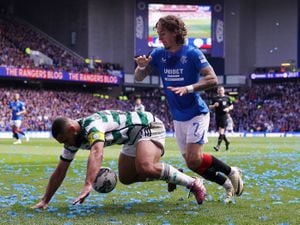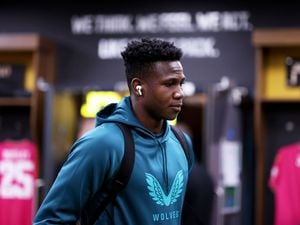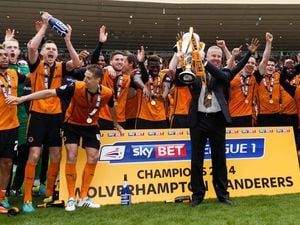Johnny Phillips: Bruno’s Wolves are still searching for an identity
Just what exactly are Bruno Lage’s Wolves?
With almost half a season gone, it is becoming harder to work out what this Wolves team is about than it was following the opening games.
After consecutive August home matches against Tottenham Hotspur and Manchester United there was much fanfare around the new look, attacking team that had thrown off the shackles of Nuno Espirito Santo’s defensive stranglehold.
Not that Wolves had scored a goal, mind you.
It is a theme that has continued in subsequent months, but it is hard to shake off a thought that all this might turn out to be the emperor’s new clothes.
Points are being won with a defence built by the previous head coach, not a free-flowing attack.
Max Kilman’s progress is a joy to behold, Romain Saiss has stepped up yet again, Conor Coady is leading by example, and Nelson Semedo – often harangued since his £27million arrival from Barcelona – is a gifted footballer who is looking increasingly reliable.
Wider analysis is difficult.
“Eighty per cent of our work is offensive”, Lage announced last month.
That claim does not stand up on the pitch.
The backs-to-the-wall displays against phenomenal Liverpool and Manchester City sides had some merit in that they quashed the sort of scenario that Leeds United wandered into at the Etihad Stadium during their 7-0 defeat.
But in both games Wolves failed to score and came away with nothing.
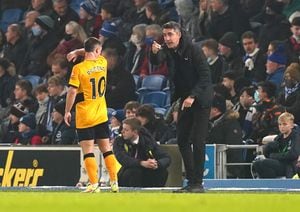
A progressive side does not adopt Leeds’s approach, but it has to offer something more than Wolves did in either game.
Speaking with first-team staff and management, the initial response to Lage’s training methods have been very positive.
“It’s fun again,” was a comment that came from more than one quarter after the opening weeks of pre-season.
Small-sided games have brought out a competitive edge and players appear energised by more variety within each individual training session. Has that led to a change in strategy?
“We’re trying to play more inside now,” said Coady, during a recent appearance on Match of The Day. “We’re trying to move the ball a little bit quicker and have a bit more possession.”
Yet against a Brighton side decimated by injuries and Covid-19 absentees, Wolves only managed 41 per cent possession and had fewer shots than their opponents.
Of course, statistical analysis can be massaged to fit all manner of narratives, but it is hard to interpret what Lage is trying to achieve on a game-by-game basis. There are no emerging patterns.
The team is clearly being coached, but it does not always play like a team which is well coached when it takes the field.
Both City and Liverpool are not just great teams, they are brilliantly organised.
Well-coached teams do not just exist at the top either.
Burnley – battling relegation – are clearly excellently coached and wedded to a structure and style that they understand inside out, even if it is neither progressive nor productive. Wolves have no identity.
In midweek at the Amex Stadium, the season was condensed into one disjointed game.
At its most exhilarating there was a spell of incisive attacking to admire. But on other occasions it resembled two poor teams squandering possession as if mired in a Championship slog-fest.
Discipline erred too, with an unnecessary number of free-kicks conceded in the final minutes which could have punished Wolves.
In support of Lage, he put a side out that was missing Raul Jimenez, Pedro Neto, Jonny and Willy Boly, before swiftly losing Hwang Hee-Chan.
That enforced substitution worked in Lage’s favour, allowing Adama Traore the opportunity and time to scare a woeful Brighton defence.
Others, particularly Coady and Neves, look rejuvenated under the new head coach.
Aside from injury problems, Lage is yet to make any substantial additions to the squad and has hinted on more than one occasion that he needs reinforcements, despite inheriting a talented bunch proven in the higher reaches of the Premier League.
The opening weeks of 2021/22 were characterised by some revisionism about the previous management – the supposed breath of fresh air under Lage contrasting with a stagnation under Nuno.
That argument conveniently ignored an astounding first two Premier League seasons and a great opening to the third before Jimenez’s injury, with the team lying sixth, derailed the progress.
The back half of 2020/21 was not enjoyable, but it represents a relatively small sample size in exceptional circumstances when assessing four years of work.
Wolves hit a remarkable peak under Nuno during the winter of two years ago.
A couple of games at Molineux stand out for their sheer relentlessness in terms of quality and physical demands – a 3-2 win over then-champions Manchester City at the end of December and a 2-1 defeat to champions-elect, Liverpool in January.
The results were different but the level of Wolves’ performance was exceptional. This was a team that played exciting football.
Nothing this season has come remotely close to those standards.
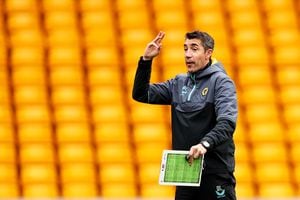
Of the seven victories in 2021/22, only one has come against a side higher in the table – West Ham United. The others have been secured by taking opportunities against weak opposition, aside from the madcap finish to the Villa match.
Maybe there is a pattern developing, based purely on results: Wolves have picked off the poor teams but struggled against better opposition. That is a notable contrast to the previous regime.
Like Nuno, Lage benefited from his connections when being appointed. He is still getting to grips with a first season in Premier League management.
Lage has an unhindered directness when he starts speaking about his ideology, and he clearly wears his heart on his sleeve.
In the technical area the demeanour of a PE teacher shuttling along the touchline, cajoling a reluctant year seven class through an unforgiving lap of cross country, suggests instructions are not always being heeded. Or maybe that is just part of the illusion.
Pragmatism has almost certainly crept in to Lage’s thinking.
“He’s got new ideas and new ways of playing, but kind of sticking to what we know as well, in terms of system,” Coady added.
Lage’s ideas remain primarily conceptual if the opening months are anything to go by.
Wolves are looking less removed from the previous regime than some imagined, while still attempting to offer something new.
Pinning anything to Lage’s team is a confusing process.
Indefinable from first minute to last, this is a Wolves still searching for its identity.


